Wyzwania dla zarządzania sztuczną inteligencją: wybrane aspekty etyczne, prawne i społeczne
DOI:
https://doi.org/10.25312/2391-5129.39/2024_01lzsoboSłowa kluczowe:
AI, adaptacja, EU, prawo, zarządzanie, globalne zarządzanieAbstrakt
Systemy sztucznej inteligencji (AI) zmieniają nasze postrzeganie świata, łącząc ludzką świadomość z technologią poprzez wirtualną rzeczywistość (VR), rozszerzoną rzeczywistość (AR) i interfejsy mózg–komputer (BCI). Zacierają one granice między rzeczywistością fizyczną a cyfrową, tworząc nowe możliwości wyrażania siebie i rozwijania zdolności poznawczych. Dzięki wirtualnym asystentom czy np. autonomicznym pojazdom AI odgrywa coraz bardziej istotną rolę w naszym życiu codziennym. Jednak jej rozwój rodzi nowe wyzwania etyczne i prawne, takie jak ochrona danych, odpowiedzialność algorytmów, przejrzystość. Problemy te wymagają nowych regulacji w Europie, USA i innych regionach świata. Współpraca między naukowcami, prawnikami i decydentami jest kluczowa, by zapewnić etyczny rozwój AI i jej pozytywny wpływ na społeczeństwo.
Pobrania
Bibliografia
Alsaibai H., Waheed S., Alaali F., Wadi R.A. (2020), Online fraud and money laundry in E-Commerce, [in:] 19th European Conference on Cyber Warfare and Security (ECCWS 2020), Academic Conferences, Reading, pp. 13–19.
Baudrillard J. (1983), Simulations, Semiotext(e), Los Angeles, pp. 1–30.
Bolu O. (2021), What is Civil Society and what is the Relevance of Civil Society Organizations (CSOs) in dictatorships and democratic Government?, https://www.researchgate.net/publication/356381304_What_is_Civil_Society_and_what_is_the_Relevance_of_Civil_Society_Organizations_CSOs_in_dictatorships_and_democratic_Government [accessed: 1.12.2024].
Brundage M., Avin S., Clark J., Toner H., Eckersley P., Garfinkel B., Dafoe A., Scharre P., Zeitzoff T., Filar B., Anderson H., Roff H., Allen G.C., Steinhardt J., Flynn C., Ó hÉigeartaigh S., Beard S., Belfield H., Farquhar S., Lyle C., Crootof R., Evans O., Page M., Bryson J., Yampolskiy R., Amodei D. (2018), The malicious use of artificial intelligence: Forecasting, prevention, and mitigation, arXiv preprint, arXiv:1802.07228, https://doi.org/10.48550/arXiv.1802.07228
Chadwick A. (2017), The hybrid media system: Politics and power, Oxford University Press, Oxford.
Chandler D. (2020), Artificial Intelligence and International Relations: AI as the New Power Reality, “Global Affairs”, vol. 6(3), pp. 16–29.
Dafoe A. (2018), AI governance: a research agenda, Governance of AI Program, Future of Humanity Institute, University of Oxford, Oxford.
Domagała M. (2004), Suwerenność a procesy integracji transnarodowej i decentralizacji, [in:] W. Kaute, P. Świercz (eds.), Demokracja, liberalizm, społeczeństwo obywatelskie. Doktryna i myśl polityczna, Wydawnictwo Uniwersytetu Śląskiego, Katowice.
Fernandez-Luque L., Imran M. (2018), Humanitarian health computing using artificial intelligence and social media: a narrative literature review, “International Journal of Medical Informatics”, vol. 114, pp. 136–142.
GPAI (2021), Global Partnership on Artificial Intelligence, https://gpai.ai/gpai-new-delhi-declaration-2024.pdf [accessed: 7.12.2024].
Habil S., El-Deeb S., El-Bassiouny N. (2023), AI-Based Recommendation Systems: The Ultimate Solution for Market Prediction and Targeting, [in:] The Palgrave Handbook of Interactive Marketing, Springer International Publishing, New York.
Jansen S. (2020), Machine Learning for Algorithmic Trading: Predictive models to extract signals from market and alternative data for systematic trading strategies with Python, Packt Publishing, Birmingham.
Javaid M., Haleem A., Khan I.H., Suman R. (2023), Understanding the potential applications of Artificial Intelligence in Agriculture Sector, Advanced Agrochem, vol. 2(1), pp. 15–30.
Karlin M. (2018), The implications of artificial intelligence for national security strategy, https://www.brookings.edu/articles/the-implications-of-artificial-intelligence-for-national-security-strategy/ [accessed: 7.12.2024].
Kemp C. (2021), Legal Aspects of Artificial Intelligence (v. 3.0), https://kempitlaw.com/wp-content/uploads/2021/02/KITL-Legal-Aspects-of-AI-v.-3.0.pdf [accessed: 7.12.2024].
Keohane R.O. (2015), The global politics of climate change: Challenge for political science, “Political Science and Politics”, vol. 48(1), pp. 19–26.
Khofman A. (2023), Exploring cognitive biases in voice-based virtual assistants, https://www.diva-portal.org/smash/get/diva2:1793781/FULLTEXT01.pdf [accessed: 7.12.2024].
Krasner S.D. (1999), Globalization and sovereignty, [in:] D.A. Smith, D.J. Solinger, S.C. Topik (eds.), States and sovereignty in the global economy, Routledge, London.
Lohr S. (2021), What ever happened to IBM’s Watson, “The New York Times”, https://www.nytimes.com/2021/07/16/technology/what-happened-ibm-watson.html [accessed: 7.12.2024].
Lucero K., Artificial Intelligence regulation and China’s future, “Columbian Journals of Asia Law”, vol. 33(94), pp. 94–99.
Mukhtarov A. (2023), The Role of Artificial Intelligence, Sensors, and Other Innovations in Facilitating Logistics Processes in the United States, Věda a perspektivy, no. 11(30), pp. 11–18.
Ndzendze B., Marwala T. (2023), Artificial intelligence and international relations theories, Springer Nature, Berlin.
Ong L.M., Findlay M. (2023), A Realist’s Account of AI for SDGs: Power, Inequality and AI in Community, [in:] The Ethics of Artificial Intelligence for the Sustainable Development Goals, Springer International Publishing, New York.
Pieniążek A. (1979), Suwerenność – problemy teorii i praktyki, Książka i Wiedza, Warszawa.
Pothumsetty R. (2020), Application of Artificial Intelligence in Algorithmic Trading, “International Journal of Applied Science and Technology”, vol. 4(12), pp. 140–149.
Pugliesi R.A. (2018), Recent Developments in AI Algorithms for Pediatric Radiology: Advancements in Detection, Diagnosis, and Management, “International Journal of Applied Health Care Analytics”, vol. 3(10), pp. 1–20.
Sezgin G., Balcıoğlu Y.S. (2023), Artificial Intelligence and its impact on society, [in:] F. Babayeva-Shukurovafarahila (ed.), 4th International “Artemis” Congress on Humanities and Social Sciences Proceedings Book, BZT Academy, Istanbul.
Slaughter A.M. (2017), The chessboard and the web: Strategies of connection in a networked world, Yale University Press, New Haven.
Steele E.T. (2019), AI, Robot: A Rhetorical Analysis of Jeopardy! Matches Featuring IBM’s Artificial Intelligence, masters thesis, Oregon State University.
Stilgoe J. (2018), Machine learning, social learning and the governance of self-driving cars, “Social Studies of Science”, vol. 48(1), pp. 25–56.
Thamba A., Gunderman R.B. (2022), For Watson, solving cancer wasn’t so elementary: prospects for artificial intelligence in radiology, “Academic Radiology”, vol. 29(2), pp. 312–314.
Thi Nguyen T. (2020), Artificial Intelligence in the Battle against Coronavirus (COVID-19): A Survey and Future Research Directions, pp. 7–9, https://www.researchgate.net/publication/340487417_Artificial_Intelligence_in_the_Battle_against_Coronavirus_COVID-19_A_Survey_and_Future_Research_Directions [accessed: 7.12.2024].
Veeramanju K.T. (2023), Revolutionizing Agriculture: A Case Study of IBM’s AI Innovations, “International Journal of Applied Engineering and Management Letters”, vol. 7(4), pp. 95–114.
Wehsener A, Reddie W., Walker L., Reiner P.J. (2023), AI-NC3 Integration in an Adversarial Context. Strategic Stability Risks and Confidence Building Measures, The Institute for Security and Technology, San Francisco, pp. 25–29.
Wolpiuk W.J. (2001), Spór o suwerenność, Wydawnictwo Sejmowe, Warszawa.
Zhang B., Dafoe A. (2019), Artificial Intelligence: American Attitudes and Trends, pp. 18–21, https://papers.ssrn.com/sol3/papers.cfm?abstract_id=3312874 [accessed: 7.12.2024].
Pobrania
Opublikowane
Numer
Dział
Licencja
Prawa autorskie (c) 2025 Akademia Humanistyczno-Ekonomiczna w Łodzi

Utwór dostępny jest na licencji Creative Commons Uznanie autorstwa – Na tych samych warunkach 4.0 Miedzynarodowe.



